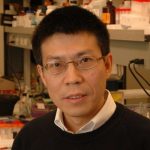Kristy Ainslie, Ph.D. applies her knowledge base in biomaterials, and immunology to develop new immune-modulatory therapies that treat and prevent infectious, and autoimmune diseases. Her lab aims to design practical and innovative formulations, taking into account the scalable production and applications in developing nations.
Center Members
The Center is a multi-disciplinary, multi-departmental entity, involving faculty members who
- share the vision and mission of the Center,
- are appointed as the Center members, and
- contribute to the Center’s work.
CNDD has been instrumental in recruiting 12 new faculty members at UNC-CH in the nanotechnology and drug delivery research area, including the current director of the center, Alexander Kabanov, Ph.D., Dr.Sci. who relocated from the University of Nebraska Medical Center with a team of 20 scientists in August 2012.
Recruitment of Kabanov, a world leader in nanomedicine as the director, has been a major milestone for CNDD. During the last four years, CNDD has grown from six to 23 core faculty members, and now includes investigators from nine different departments at UNC, NCSU and Duke University.
There are six adjunct center members who contribute to center activities, such as graduate courses in the area of drug delivery and nanomedicine, facilitation of the Carolina Nanofomulation Workshop, and more.
The Center’s membership growth has been enhanced by
- recruitment of new faculty working in the area of drug delivery and nano medicine,
- development of new collaborations between faculty in the area of drug delivery and nano medicine,
- establishment of cross-center programs and activities, and
- development of resources including core facilities that facilitate nanomedicine research and educational activities of center members.
Faculty with UNC Chapel Hill Appointments
Eric M. Bachelder, PhD
Bachelder focuses on the development of biomaterials for the treatment of diseases associated with the immune system, inlcuding using liposomes, acid sensitive polymers, and tissue engineering scaffolds.
Edward Bahnson, PhD
Dr. Edward Moreira Bahnson joined the Dept. of Cell Biology & Physiology, and the Center for Nanotechnology in Drug Delivery as a tenure-track Assistant Professor in 2017. Dr. Bahnson’s research program focuses on the study of arterial disease, and developing new therapies to treat cardiovascular disease. He aims to understand the difference in plaque progression, and restenosis rates when there are changes in the redox environment of the vascular wall, with the goal of developing redox-based targeted therapies for the vasculature.
Yevgeny Brudno, PhD
Yevgeny (Yev) Brudno received dual B.A. degrees in Chemistry and Biophysics from the University of Pennsylvania and his PhD in Organic Chemistry from Harvard University, working with David Liu to develop directed evolution technologies. From there, Yev worked as a postdoctoral fellow at the Wyss Institute at Harvard with Prof. David Mooney, developing controlled release drug delivery technologies for cancer and regenerative medicine. Yev’s research interests span organic synthetic chemistry, materials science, and cellular immunotherapy. Mostly recently, his lab develops materials to improve cell therapies, including CAR T cells. Our lab’s research is rooted in the belief that advances in chemistry and the basic molecular sciences can generate meaningful change in how therapies are designed, produced, and administered.
John Fallon, PhD
Fallon’s research focuses on quantitative targeted proteomics (QTAP) using nano- and microLC-MS/MS. The methods employ proteolytic digestion followed by representative peptide detection. Proteins quantified include drug metabolizing enzymes, such as CYP450s, and transporters, often in complex biological matrices such as liver, kidney, intestine and lung. The methods have applicability in characterizing drug response, including adverse drug reactions, as well as in understanding disease progression and treatment. The techniques are being expanded to the quantification of proteins associated with various cancers and the immune system. As a researcher in the Center for Nanotechnology in Drug Delivery Fallon uses QTAP to help bridge the knowledge gap between the use of modern drug delivery materials and their effects on protein expression in biological systems.
Owen S. Fenton, PhD
Owen S. Fenton, Ph.D. is an Assistant Professor in the Division of Pharmacoengineering and Molecular Pharmaceutics at the UNC Eshelman School of Pharmacy. Owen conducted his Ph.D. and postdoctoral studies in the laboratories of Professors Daniel Anderson and Robert Langer at the Massachusetts Institute of Technology. Current research efforts in the Fenton laboratory explore the discovery and development of non-viral carrier platforms to improve the efficacy and safety of RNA therapeutics.
Ronit Freeman, PhD
Peptides and DNA represent two of the most attractive categories of molecules for the construction of nanomaterials for biology and medicine. Peptides provide a rich palette of biological functionality and self-assembly behavior and DNA can be used to construct complex nanostructures with programmable, dynamic properties. Dr. Freeman has sought to merge the advantages of these two molecular platforms through the use of peptide-DNA, P-DNA, hybrid biomaterials and utilize them to mimic the extracellular environment. The reversibility and tunability enabled by the DNA will be new handles for us to study dynamic properties of soft materials.
Zongchao Han, PhD, MD
Dr. Han trained in neuroscience with specialty in viral and non-viral nano-biomaterials-mediated gene/drug therapy. His research focuses on the use of nanotechnologies and biocompatible materials to develop safe and effective gene and drug therapies for limiting the effects of retinal blinding diseases. His focus for over fifteen years has been hereditary retinal and macular degenerations, including eye tumors.
Shawn D Hingtgen, PhD
Due to their expansive utility, stem cell-based therapies hold the potential to redefine therapeutic approaches and provide cures for many terminal diseases. In the Hingtgen lab, we seek to harness the potential of stem cells to develop new and better methods for treating terminal cancers, including brain cancer. We use an integrative approach that begins with creating specially designed targeted therapeutic proteins.
Alexander V. Kabanov, PhD
Alexander “Sasha” Kabanov, Ph.D., Dr.Sci., is the Mescal Swaim Ferguson Distinguished Professor and director of the Center for Nanotechnology in Drug Delivery at the UNC Eshelman School of Pharmacy and codirector of the Carolina Institute for Nanomedicine at the University of North Carolina at Chapel Hill. Prior to joining UNC-Chapel Hill in July 2012, Kabanov served for nearly eighteen years at the University of Nebraska Medical Center where he was the Parke-Davis Professor of Pharmaceutical Sciences and director of the Center for Drug Delivery and Nanomedicine, which he founded in 2004.
Sam Lai, PhD
Sam Lai, Ph.D., was born in Hong Kong and spent his childhood in both Hong Kong and Vancouver. After completing high school at Phillips Academy, Andover, he attended Cornell University and received his BS in chemical and biomolecular engineering in 2003. He then undertook doctoral studies at Johns Hopkins University, receiving his PhD in chemical and biomolecular engineering in 2007. Following a one-year postdoc, he became a research assistant professor at Johns Hopkins in fall 2008 before joining the UNC Eshelman School of Pharmacy in fall 2010.
Rihe Liu, PhD
ACCEPTING DOCTORAL STUDENTS
The Liu laboratory’s research interests focus on the development and application of novel drug target-binding affinity molecules by integrating directed molecular selection and evolution, ligand design and engineering, in vitro cellular and signaling characterization, and in vivo therapeutic efficacy studies in tumor mouse models. The Liu laboratory has extensive experiences in the design, synthesis, characterization, and delivery of diagnostic and therapeutic agents based on both polypeptides and polynucleotides.
Juliane Nguyen, PhD
Dr. Juliane Nguyen is a Professor in the Division of Pharmacoengineering and Molecular Pharmaceutics. Her translational research program focuses on developing the next generation of safe and effective biotherapeutics for life-threatening diseases such as cancer and myocardial infarction.
Jillian Perry, PhD
Jillian Perry, PhD, leverages her knowledge of polymer chemistry, biomaterials, and drug delivery to develop novel drug delivery carriers for the treatment of cancer and infectious diseases. Current research interests lay in utilizing high resolution 3D printing for the development of scaffolds for cell/drug delivery, scaffolds for 3D cell culture, generation of solid microarray patches (MAPs) for transdermal drug/vaccine delivery, as well as hollow MAPs for interstitial fluid sampling.
Jillian received both her bachelors of science in chemical engineering and PhD in biomedical engineering from the University of Florida. She completed a postdoctoral fellowship here at the University of North Carolina under the mentorship of Dr. Joseph DeSimone. She joined the UNC Eshelman School of Pharmacy in 2019 as a research assistant professor in the Division of Pharmacoengineering and Molecular Pharmaceutics and is a member of the Center for Nanotechnology in Drug Delivery.
Marina Sokolsky, PhD
Sokolsky-Papkov’s current research centers on design of nano-based, sustained release and remote actuated drug delivery systems for treatment and diagnosis of cancer. My research utilizes several platform nanoparticles based technologies (polymeric micelles and nanoparticles, cell derived exosomes and inorganic nanoparticles) and is focused on engineering treatment modalities for two main types of cancer: brain cancer and brain metastases and diagnosis and treatment of post operative residual disease and metastatic spread with emphasis on (1) designing drug loaded nanoparticles which can effectively home to brain cancer in vivo and deliver tumor specific payload to improve treatment efficacy (2) utilize sustained release and nanotechnology approaches to design delivery systems which can improve non invasive diagnosis of primary metastatic spread, treat residual disease and promote post-operative would healing and (3) utilize intrinsic properties of inorganic nanoparticles to design theranostic delivery systems which combine remotely induced drug release and cell apoptosis.
Alexander Tropsha, PhD
ACCEPTING DOCTORAL STUDENTS
Alex Tropsha, Ph.D., is an expert in the fields of computational chemistry, cheminformatics and data science. His laboratory develops new methodologies, software tools and applications in the areas of computer-assisted drug design, chemical toxicology, materials informatics, text mining, and health care informatics.
William Zamboni, PhD
William Zamboni, Pharm.D., Ph.D., is a professor in the Division of Pharmacotherapy and Experimental Therapeutics and UNC Lineberger Comprehensive Cancer Center. He is the director of the UNC Advanced Translational Pharmacology and Analytical Chemistry (ATPAC) Lab and Recharge Center in the Eshelman School of Pharmacy, the UNC Lineberger Comprehensive Cancer Center (LCCC), and the Carolina Institute of Nanomedicine. His research interests focus on the application of pharmacokinetic, pharmacodynamic, and pharmacogenetic principles in the optimization of the chemotherapeutic treatment of cancer.
Faculty with UNC/NC State Joint Department of Biomedical Engineering Appointments
Rahima Benhabbour, PhD
Rahima Benhabbour is an Assistant Professor at the UNC_NCSU Joint Department of Biomedical Engineering at UNC-Chapel Hill. After completing her doctorate degree in chemistry in 2008 at McMaster University in Canada, Benhabbour completed a postdoctoral fellowship at the UNC Eshelman School of Pharmacy and was promoted to Research Assistant Professor in December 2010. In September 2017, she was hired as an Assistant Professor at the UNC_NCSU Joint Biomedical Engineering Department with an Adjunct Appointment at the UNC Eshelman School of Pharmacy.
Paul Dayton, PhD
Dr. Dayton’s research involves developing new technologies for imaging blood flow, microvasculature, and molecular markers using ultrasound and microbubble contrast agents. Several of Dr. Dayton’s recent contributions to the field include techniques to improve the sensitivity and consistency of ultrasound imaging through optimization of contrast agent size distribution, the demonstration of high-resolution, high-SNR ultra-broadband imaging and techniques for real-time molecular imaging. An additional area of interest is ultrasound-mediated therapeutics with micro and nanoparticles. Dr. Dayton’s primary interest is developing and applying tools for non-invasive assessment of angiogenesis progression and tumor response to therapy. Dr. Dayton’s lab is part of the UNC-NCSU Ultrasound Research Consortium.
Faculty with Duke University Appointments
Ashutosh Chilkoti, Ph.D.
 Ashutosh Chilkoti is the Theo Pilkington Professor and the chair of the Department of Biomedical Engineering at Duke University. His research in biomolecular engineering and biointerface science focuses on the development of new molecular tools and technology’s that borrow from molecular biology, protein engineering, polymer chemistry, and surface science that can then be exploited for the development of applications that span the range from bioseparations, plasmonic biosensors, low-cost clinical diagnostics, and drug delivery. Dr. Chilkoti received his Ph.D. from The University of Washington.
Ashutosh Chilkoti is the Theo Pilkington Professor and the chair of the Department of Biomedical Engineering at Duke University. His research in biomolecular engineering and biointerface science focuses on the development of new molecular tools and technology’s that borrow from molecular biology, protein engineering, polymer chemistry, and surface science that can then be exploited for the development of applications that span the range from bioseparations, plasmonic biosensors, low-cost clinical diagnostics, and drug delivery. Dr. Chilkoti received his Ph.D. from The University of Washington.
David Needham, Ph.D.
 David Needham is a Professor in the Department of Mechanical Engineering and Materials Science at Duke University, with joint appointments in the Department of Biomedical Engineering and the Duke Comprehensive Cancer Center. His lab uses a platform technology of micropipette manipulation to manipulate single and pairs of micro particles in order to assess their behavior in well-defined fluids and excipient concentrations. Dr. Needham brings a wealth of expertise in micromanipulation, colloid stability, and drug delivery formulation. Research topics currently under investigation include: lipid and surfactant monolayers at gas bubble, and liquid emulsion surfaces; diffusion-solubility, crystallization and solidification of polymers, lipids, proteins, inorganic crystals and drugs from 2 phase Microsystems, including degradable PLGA polymer microspheres. Dr. Needham received his B.S. at Nottingham Trent University and completed his Ph.D. at the University of Nottingham.
David Needham is a Professor in the Department of Mechanical Engineering and Materials Science at Duke University, with joint appointments in the Department of Biomedical Engineering and the Duke Comprehensive Cancer Center. His lab uses a platform technology of micropipette manipulation to manipulate single and pairs of micro particles in order to assess their behavior in well-defined fluids and excipient concentrations. Dr. Needham brings a wealth of expertise in micromanipulation, colloid stability, and drug delivery formulation. Research topics currently under investigation include: lipid and surfactant monolayers at gas bubble, and liquid emulsion surfaces; diffusion-solubility, crystallization and solidification of polymers, lipids, proteins, inorganic crystals and drugs from 2 phase Microsystems, including degradable PLGA polymer microspheres. Dr. Needham received his B.S. at Nottingham Trent University and completed his Ph.D. at the University of Nottingham.
Michael Rubinstein, Ph.D.
 Michael Rubinstein’s research focuses on various properties of polymeric systems. The types of repeating units that make up the polymers and the way these molecular chains coil up determine what properties the polymer will have, making a material strong like silk or bouncy like rubber. Dr. Rubinstein aims to understand and model these various properties so researchers can design new materials that exhibit more interesting and useful features based on what functions the material needs to perform. Dr. Rubinstein completed his M.A. and Ph.D. in Theoretical Physics at Harvard University. He is now a faculty member at Duke University in the Department of Mechanical Engineering and Materials Science, with joint appointments in the Departments of Biomedical Engineering, Chemistry, and Physics.
Michael Rubinstein’s research focuses on various properties of polymeric systems. The types of repeating units that make up the polymers and the way these molecular chains coil up determine what properties the polymer will have, making a material strong like silk or bouncy like rubber. Dr. Rubinstein aims to understand and model these various properties so researchers can design new materials that exhibit more interesting and useful features based on what functions the material needs to perform. Dr. Rubinstein completed his M.A. and Ph.D. in Theoretical Physics at Harvard University. He is now a faculty member at Duke University in the Department of Mechanical Engineering and Materials Science, with joint appointments in the Departments of Biomedical Engineering, Chemistry, and Physics.
Tatiana Segura, Ph.D.
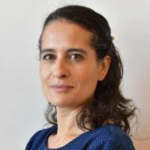 Tatiana Segura’s research interests are in the design of biomaterials to promote endogenous repair and reduction of inflammation through the design of the geometry of the material, and delivering genes, proteins and drugs. Research in the Segura Laboratory focuses on engineering hydrogel biomaterials to support the formation of a reparative niche within damaged or diseased sites of the body. Dr. Segura received her B.S. degree in Bioengineering from the University of California Berkeley and her doctorate in Chemical Engineering from Northwestern University. She is now a faculty member at Duke University in the Department of Biomedical Engineering with joint appointments in the Departments of Neurology and Dermatology.
Tatiana Segura’s research interests are in the design of biomaterials to promote endogenous repair and reduction of inflammation through the design of the geometry of the material, and delivering genes, proteins and drugs. Research in the Segura Laboratory focuses on engineering hydrogel biomaterials to support the formation of a reparative niche within damaged or diseased sites of the body. Dr. Segura received her B.S. degree in Bioengineering from the University of California Berkeley and her doctorate in Chemical Engineering from Northwestern University. She is now a faculty member at Duke University in the Department of Biomedical Engineering with joint appointments in the Departments of Neurology and Dermatology.
Fan Yuan, Ph.D.
 Fan Yuan’s research interests include drug and gene delivery, mechanisms of molecular transport in cells and tissues, and tumor pathophysiology. The goal of Dr. Yuan’s research is two-fold. One is to improve delivery of therapeutic agents in solid tumors; and the second is to understand mechanisms of drug resistance in tumors caused by intrinsic cellular heterogeneity and physiological barriers. These studies may provide useful information on how to improve clinical treatment of cancer based on currently available drugs or molecular medicines in the future. Research projects include quantification of transport parameters, delivery of drugs encapsulated in temperature sensitive liposomes, physical interventions of drugs, electric field-mediated gene delivery, mathematical modeling of drug and gene delivery. Dr. Yuan received his B.S. and M.S. at Beijing University, and completed his Ph.D. at City University of New York.
Fan Yuan’s research interests include drug and gene delivery, mechanisms of molecular transport in cells and tissues, and tumor pathophysiology. The goal of Dr. Yuan’s research is two-fold. One is to improve delivery of therapeutic agents in solid tumors; and the second is to understand mechanisms of drug resistance in tumors caused by intrinsic cellular heterogeneity and physiological barriers. These studies may provide useful information on how to improve clinical treatment of cancer based on currently available drugs or molecular medicines in the future. Research projects include quantification of transport parameters, delivery of drugs encapsulated in temperature sensitive liposomes, physical interventions of drugs, electric field-mediated gene delivery, mathematical modeling of drug and gene delivery. Dr. Yuan received his B.S. and M.S. at Beijing University, and completed his Ph.D. at City University of New York.
Tatiana Bronich, Ph.D.
 Tatiana Bronich’s research interests are in the area of self-assembling polymer materials and applications of these materials in medicine. Of special interest is the design and study of novel types of functional materials based on complexes formed between block ionomers and oppositely charged polymers and low molecular weight amphiphilic molecules. These systems are of great fundamental importance as models of biological systems formed as a result of self-assembly processes. In addition, her recent work has expanded to include the application of these amphiphilic block copolymers and block ionomer complexes in drug delivery to treat cancer and the development of the polycation-DNA complexes for gene delivery. Bronich completed her M.S. and Ph.D. at Moscow State University.
Tatiana Bronich’s research interests are in the area of self-assembling polymer materials and applications of these materials in medicine. Of special interest is the design and study of novel types of functional materials based on complexes formed between block ionomers and oppositely charged polymers and low molecular weight amphiphilic molecules. These systems are of great fundamental importance as models of biological systems formed as a result of self-assembly processes. In addition, her recent work has expanded to include the application of these amphiphilic block copolymers and block ionomer complexes in drug delivery to treat cancer and the development of the polycation-DNA complexes for gene delivery. Bronich completed her M.S. and Ph.D. at Moscow State University.
Joseph M. DeSimone, Ph.D.
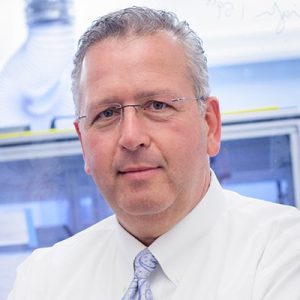 The recent breakthroughs in the DeSimone laboratories using specifically-designed materials for imprint or soft lithography have enabled an extremely versatile and flexible method for the direct fabrication and harvesting of monodisperse, shape-specific nano-biomaterials. The method, referred to as Particle Replication In Non-wetting Templates, or PRINT, allows for the fabrication of monodisperse particles with simultaneous control over structure (i.e. shape, size, composition) and function (i.e. cargo, surface structure).
The recent breakthroughs in the DeSimone laboratories using specifically-designed materials for imprint or soft lithography have enabled an extremely versatile and flexible method for the direct fabrication and harvesting of monodisperse, shape-specific nano-biomaterials. The method, referred to as Particle Replication In Non-wetting Templates, or PRINT, allows for the fabrication of monodisperse particles with simultaneous control over structure (i.e. shape, size, composition) and function (i.e. cargo, surface structure).
Kazunori Kataoka, Ph.D.
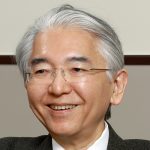 Kazunori Kataoka serves as director of the Center for NanoBio Integration at the University of Tokyo. He serves as a member of the scientific advisory board at Appian Labs, LLC. He is the Editor of Journal of Biomaterials Science, Polymer Edition, the editor of Journal of Controlled Release (Controlled Release Society), and the associate editor of Biomacromolecules (American Chemical Society). He has been the President of Japanese Society of Gene Design and Delivery since 2004 and a vice president of the Society of Polymer Science, Japan since 2008. He serves on the editorial board of twelve international journals. He has been a visiting professor at Ludwig-Maximilian University of Munich since 2008. He is professor of Biomaterials at the University of Tokyo, with a joint appointment in the Division of Clinical Biotechnology at the Center for Disease Biology and Integrative Medicine at the University of Tokyo Medical School. He received B.S. (1974) degree in Organic Chemistry, and M.S. (1976) and Ph.D. (1979) degrees in Polymer Chemistry at the University of Tokyo under the guidance of Prof. Teiji Tsuruta.
Kazunori Kataoka serves as director of the Center for NanoBio Integration at the University of Tokyo. He serves as a member of the scientific advisory board at Appian Labs, LLC. He is the Editor of Journal of Biomaterials Science, Polymer Edition, the editor of Journal of Controlled Release (Controlled Release Society), and the associate editor of Biomacromolecules (American Chemical Society). He has been the President of Japanese Society of Gene Design and Delivery since 2004 and a vice president of the Society of Polymer Science, Japan since 2008. He serves on the editorial board of twelve international journals. He has been a visiting professor at Ludwig-Maximilian University of Munich since 2008. He is professor of Biomaterials at the University of Tokyo, with a joint appointment in the Division of Clinical Biotechnology at the Center for Disease Biology and Integrative Medicine at the University of Tokyo Medical School. He received B.S. (1974) degree in Organic Chemistry, and M.S. (1976) and Ph.D. (1979) degrees in Polymer Chemistry at the University of Tokyo under the guidance of Prof. Teiji Tsuruta.
Natalia Klyachko, Ph.D.
 Natalia Klyachko serves as deputy director of Nanobiomaterials and Nanobiotechnology at Moscow State University, as well as a professor in Chemistry, and as deputy head chair of Chemical Enzymology at MSU.
Natalia Klyachko serves as deputy director of Nanobiomaterials and Nanobiotechnology at Moscow State University, as well as a professor in Chemistry, and as deputy head chair of Chemical Enzymology at MSU.
Robert Luxenhofer, Ph.D.
 Robert Luxenhofer completed his doctorate in polymer chemistry with the development of novel functional polymers for applications in nanomedicine at the Technische Universität München, Germany, in 2007. During a postdoctoral stay at the University of Nebraska Medical Center in Omaha, Nebraska, USA he studied endocytosis of different nanomedicines and developed novel high-capacity drug delivery systems. In 2009 he moved to the Technische Universität Dresden, Germany and is since developing high-performance polymers for applications in nanomedicine.
Robert Luxenhofer completed his doctorate in polymer chemistry with the development of novel functional polymers for applications in nanomedicine at the Technische Universität München, Germany, in 2007. During a postdoctoral stay at the University of Nebraska Medical Center in Omaha, Nebraska, USA he studied endocytosis of different nanomedicines and developed novel high-capacity drug delivery systems. In 2009 he moved to the Technische Universität Dresden, Germany and is since developing high-performance polymers for applications in nanomedicine.
Aaron Mohs, Ph.D.
 Aaron Mohs received his B.A. in Chemistry from St. John’s University/College of St. Benedict (Collegeville, MN). He subsequently completed his Ph.D. in Pharmaceutics and Pharmaceutical Chemistry at the University of Utah, training under Zheng-Rong Lu. Most recently, Mohs completed his postdoctoral fellowship in joint Emory-Georgia Tech Department of Biomedical Engineering, as an Emory-GT Center for Cancer Nanotechnology Excellence Distinguished Fellow under the mentorship of Shuming Nie.
Aaron Mohs received his B.A. in Chemistry from St. John’s University/College of St. Benedict (Collegeville, MN). He subsequently completed his Ph.D. in Pharmaceutics and Pharmaceutical Chemistry at the University of Utah, training under Zheng-Rong Lu. Most recently, Mohs completed his postdoctoral fellowship in joint Emory-Georgia Tech Department of Biomedical Engineering, as an Emory-GT Center for Cancer Nanotechnology Excellence Distinguished Fellow under the mentorship of Shuming Nie.
Judy Riffle, Ph.D.
 Judy Riffle received a B.S. in Textiles from Virginia Tech, as well as completing her Ph.D. in Chemistry and serving as a postdoctoral fellow in the Department of Chemistry at VT. Dr. Riffle managed the Materials Division of Thoratec Laboratories before advancing to V.P. of Research and Development there. She has and continues to serve as a professor in the Chemistry Department at Virginia Tech, where she is also the director of Macromolecular Science and Engineering Education.
Judy Riffle received a B.S. in Textiles from Virginia Tech, as well as completing her Ph.D. in Chemistry and serving as a postdoctoral fellow in the Department of Chemistry at VT. Dr. Riffle managed the Materials Division of Thoratec Laboratories before advancing to V.P. of Research and Development there. She has and continues to serve as a professor in the Chemistry Department at Virginia Tech, where she is also the director of Macromolecular Science and Engineering Education.
Andrew Wang, M.D.
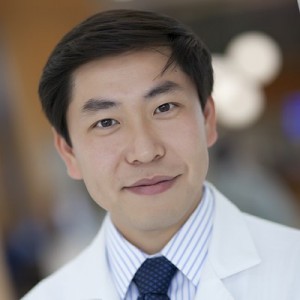 The central theme of Wang’s research program is to apply advances from other fields such as chemical engineering, materials science, biomedical engineering and nanotechnology, to the field of oncology.
The central theme of Wang’s research program is to apply advances from other fields such as chemical engineering, materials science, biomedical engineering and nanotechnology, to the field of oncology.
Mohamed Attia, PhD, Postdoctoral Research Associate
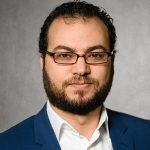 Dr. Attia joined the CCNTP at the laboratory of Alexander Kabanov in 2020. He received his B.S. and M.S. degrees in chemistry from Sohag University and Cairo University, Egypt, respectively. He earned his Ph.D. in pharmaceutical chemistry from Strasbourg University, France in 2016. He then joined both the bioengineering and chemistry departments in Clemson University as a postdoc research associate. Most recently, two press releases have been issued and posted on Clemson newsstand about his work and winning the 2020 Clemson University distinguished postdoc award. He served as a guest editor for a special issue “Polymers for Biomedical Imaging and Therapy” in Polymers, MDPI. The central theme of his research, in cancer nanomedicine, aims to design smart vectors (i.e., polymer, lipid, and inorganic nanomaterials) to deliver a wide range of therapeutic/contrast agents and targeting moieties, and to fabricate multifunctional nanoparticles for combinatory therapy and theranostic applications using cutting edge technologies. His long-term research career is to facilitate the translation of nanoparticle-based therapeutics from the lab to the clinic.
Dr. Attia joined the CCNTP at the laboratory of Alexander Kabanov in 2020. He received his B.S. and M.S. degrees in chemistry from Sohag University and Cairo University, Egypt, respectively. He earned his Ph.D. in pharmaceutical chemistry from Strasbourg University, France in 2016. He then joined both the bioengineering and chemistry departments in Clemson University as a postdoc research associate. Most recently, two press releases have been issued and posted on Clemson newsstand about his work and winning the 2020 Clemson University distinguished postdoc award. He served as a guest editor for a special issue “Polymers for Biomedical Imaging and Therapy” in Polymers, MDPI. The central theme of his research, in cancer nanomedicine, aims to design smart vectors (i.e., polymer, lipid, and inorganic nanomaterials) to deliver a wide range of therapeutic/contrast agents and targeting moieties, and to fabricate multifunctional nanoparticles for combinatory therapy and theranostic applications using cutting edge technologies. His long-term research career is to facilitate the translation of nanoparticle-based therapeutics from the lab to the clinic.Colin Basham, PhD, T32 Fellow
 Dr. Colin Basham received his PhD in Biomedical Engineering from the University of Tennessee, Knoxville, in spring 2023. His research there focused on how the material properties of inorganic nanoparticles impact their interactions with model cell membranes, which can dictate passive membrane translocation and nanoparticle-induced cellular toxicity. Dr. Basham joined the CCNTP in fall 2023 under the guidance of Dr. Alexander Kabanov, Dr. Charles Perou and Dr. Benjamin Vincent. His current work focuses on the development of lipid nanoparticles to deliver mRNAs for targeted cancer treatment.
Dr. Colin Basham received his PhD in Biomedical Engineering from the University of Tennessee, Knoxville, in spring 2023. His research there focused on how the material properties of inorganic nanoparticles impact their interactions with model cell membranes, which can dictate passive membrane translocation and nanoparticle-induced cellular toxicity. Dr. Basham joined the CCNTP in fall 2023 under the guidance of Dr. Alexander Kabanov, Dr. Charles Perou and Dr. Benjamin Vincent. His current work focuses on the development of lipid nanoparticles to deliver mRNAs for targeted cancer treatment.Zhenzhen Chen, PhD, T32 Fellow
 Dr. Zhenzhen Chen joined the CCNTP in 2022. She earned her Ph.D. in Material Science and Engineering at Clarkson University in 2022. Her research focused on the synthesis of functionalized Nano materials and their applications in biomedical area. Her current research focuses on immune recognition of triple-negative breast cancer stimulated by killing tumor associated bacteria with Ag0-drug nanostructures. Dr. Chen is working under the guidance of Dr. Juliane Nguyen and Dr. Eric Bachelder, with previous mentorship from Dr. Leaf Huang.
Dr. Zhenzhen Chen joined the CCNTP in 2022. She earned her Ph.D. in Material Science and Engineering at Clarkson University in 2022. Her research focused on the synthesis of functionalized Nano materials and their applications in biomedical area. Her current research focuses on immune recognition of triple-negative breast cancer stimulated by killing tumor associated bacteria with Ag0-drug nanostructures. Dr. Chen is working under the guidance of Dr. Juliane Nguyen and Dr. Eric Bachelder, with previous mentorship from Dr. Leaf Huang.William Green, PhD, T32 Fellow
 Dr. Will Green received his PhD in Nutrition in 2020 from the University of North Carolina at Chapel Hill. He joined Dr. Justin Milner’s lab in the Lineberger Comprehensive Cancer Center, where his research focused on differentiation programs of cytotoxic CD8 T cells in the context of infection and cancer. Dr. Green developed several new T cell specific cancer cells lines including those for pancreatic ductal adenocarcinoma, triple negative breast cancer, B-cell lymphoma, and others. Dr. Green joined the CCNTP in July 2023 under the guidance of Dr. Justin Milner and is associated with the lab of Dr. Alexander Kabanov, where his work focuses on harnessing nanoparticle delivery systems for in vivo TIL and CAR-T cell reprogramming therapy against solid tumors.
Dr. Will Green received his PhD in Nutrition in 2020 from the University of North Carolina at Chapel Hill. He joined Dr. Justin Milner’s lab in the Lineberger Comprehensive Cancer Center, where his research focused on differentiation programs of cytotoxic CD8 T cells in the context of infection and cancer. Dr. Green developed several new T cell specific cancer cells lines including those for pancreatic ductal adenocarcinoma, triple negative breast cancer, B-cell lymphoma, and others. Dr. Green joined the CCNTP in July 2023 under the guidance of Dr. Justin Milner and is associated with the lab of Dr. Alexander Kabanov, where his work focuses on harnessing nanoparticle delivery systems for in vivo TIL and CAR-T cell reprogramming therapy against solid tumors.Son Long Ho, PhD, T32 Fellow
 Dr. Ho joined the CCNTP in 2023 under the co-supervision of Dr. Zibo Li, Dr. Hong Yuan, and Dr. Alexander Kabanov. He received his Ph.D. in applied chemistry from Kyungpook National University, South Korea in 2015. During his postdoctoral fellowship in the Department of Chemistry, Kyungpook National University, Dr. Ho’s research focused on preparing lanthanide oxide nanoparticles for biomedical applications, such as MR and fluorescent imaging and neutron capture therapy. His recent work focuses on development of labeling methods for radiotheranostics by carbon dot.
Dr. Ho joined the CCNTP in 2023 under the co-supervision of Dr. Zibo Li, Dr. Hong Yuan, and Dr. Alexander Kabanov. He received his Ph.D. in applied chemistry from Kyungpook National University, South Korea in 2015. During his postdoctoral fellowship in the Department of Chemistry, Kyungpook National University, Dr. Ho’s research focused on preparing lanthanide oxide nanoparticles for biomedical applications, such as MR and fluorescent imaging and neutron capture therapy. His recent work focuses on development of labeling methods for radiotheranostics by carbon dot.Kyoungtea Kim, PhD, Postdoctoral Research Associate
 Kyoungtea Kim obtained his B.S. and M.S. in Biotechnology and Bioscience from Konkuk University, South Korea, and earned his doctorate at University of Wisconsin-Madison in Molecular and Environmental Toxicology, under the supervision of Joel A. Pedersen. His background is in nanomaterial interactions at nano-bio interfaces. As part of the Center for Nanotechnology in Drug Delivery, his research interests currently lie in polymeric nano-formulations of drug molecules in order to enhance the extent of drug delivery. Outside the lab, he likes to explore coffee shops, experience different cultures, and listen to music.
Kyoungtea Kim obtained his B.S. and M.S. in Biotechnology and Bioscience from Konkuk University, South Korea, and earned his doctorate at University of Wisconsin-Madison in Molecular and Environmental Toxicology, under the supervision of Joel A. Pedersen. His background is in nanomaterial interactions at nano-bio interfaces. As part of the Center for Nanotechnology in Drug Delivery, his research interests currently lie in polymeric nano-formulations of drug molecules in order to enhance the extent of drug delivery. Outside the lab, he likes to explore coffee shops, experience different cultures, and listen to music.Edikan Archibong Ogunnaike, PhD, Postdoctoral Research Associate
 Dr. Ogunnaike joined UNC in 2018. She received her B.S. and M.S. from Florida A& M University, and her Ph.D. at the University of South Florida from the Department of Chemical and Biomedical Engineering. She is currently working under the guidance of Drs. Gianpietro Dotti and Frances Ligler in the area of nanotechnology and cell engineering to develop a smart biomaterial which can be used in the delivery of engineered t-cells against solid tumors.
Dr. Ogunnaike joined UNC in 2018. She received her B.S. and M.S. from Florida A& M University, and her Ph.D. at the University of South Florida from the Department of Chemical and Biomedical Engineering. She is currently working under the guidance of Drs. Gianpietro Dotti and Frances Ligler in the area of nanotechnology and cell engineering to develop a smart biomaterial which can be used in the delivery of engineered t-cells against solid tumors.
Marta Overchuk, PhD, Postdoctoral Research Associate
 Dr. Overchuk earned her PhD in Biomedical Engineering from the University of Toronto in 2021. Her research focused on using light and light-activated molecules for precise cancer cell destruction through photodynamic therapy. She explored combining this method with nanomedicine to enhance chemotherapy delivery to tumors, aiming to reduce toxicity while maintaining treatment effectiveness. Her doctoral work earned her a Vanier Canada Graduate Scholarship, which recognizes Canada’s top graduate students who have demonstrated exceptional leadership and scholarly achievement. In March 2022, Dr. Overchuk joined Dr. Imran Rizvi’s lab at UNC-Chapel Hill as a Postdoctoral Fellow, where she applies her expertise in photochemistry to combat chemoresistance in gynecologic malignancies. She has co-authored 18 peer-reviewed publications, 2 invited perspectives, and holds one US patent.
Dr. Overchuk earned her PhD in Biomedical Engineering from the University of Toronto in 2021. Her research focused on using light and light-activated molecules for precise cancer cell destruction through photodynamic therapy. She explored combining this method with nanomedicine to enhance chemotherapy delivery to tumors, aiming to reduce toxicity while maintaining treatment effectiveness. Her doctoral work earned her a Vanier Canada Graduate Scholarship, which recognizes Canada’s top graduate students who have demonstrated exceptional leadership and scholarly achievement. In March 2022, Dr. Overchuk joined Dr. Imran Rizvi’s lab at UNC-Chapel Hill as a Postdoctoral Fellow, where she applies her expertise in photochemistry to combat chemoresistance in gynecologic malignancies. She has co-authored 18 peer-reviewed publications, 2 invited perspectives, and holds one US patent.Yuyan Wang, PhD, T32 Fellow
 Dr. Yuyan Wang received her B.S. and Ph.D. in Biomedical Engineering from Georgia Institute of Technology and Cornell University, respectively. During her Ph.D. she was a fellow of the National Science Foundation Graduated Research Fellowship Program and her research focused on design and production of engineered glycoproteins for osteoarthritis treatment and drug delivery. Dr. Wang joined the CCNTP in 2023 and is currently working with Dr. Juliane Nguyen and Dr. Brian Miller, with prior mentorship from Dr. Leaf Huang. Her work focuses on the development of engineered yeast for colorectal cancer treatment.
Dr. Yuyan Wang received her B.S. and Ph.D. in Biomedical Engineering from Georgia Institute of Technology and Cornell University, respectively. During her Ph.D. she was a fellow of the National Science Foundation Graduated Research Fellowship Program and her research focused on design and production of engineered glycoproteins for osteoarthritis treatment and drug delivery. Dr. Wang joined the CCNTP in 2023 and is currently working with Dr. Juliane Nguyen and Dr. Brian Miller, with prior mentorship from Dr. Leaf Huang. Her work focuses on the development of engineered yeast for colorectal cancer treatment.












